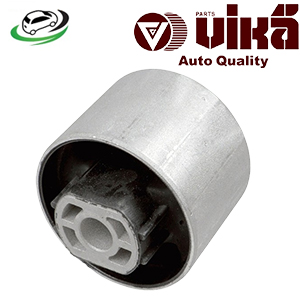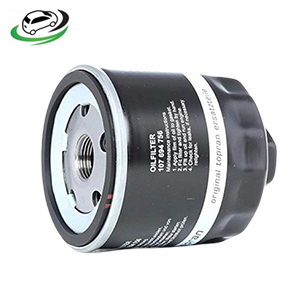-32%
Get Oil Filter Assy Volkswagen Polo 1.4l / Audi A2 030115561AB
The oil filter is an essential component in the lubrication system of an internal combustion engine. It plays a critical role in maintaining the engine’s health and longevity by filtering out contaminants from the engine oil. This essay delves into the function, types, design, materials, maintenance, and benefits of oil filters, emphasizing their significance in automotive engineering.
Function of Oil Filters
The primary function of an oil filter is to remove contaminants from the engine oil. These contaminants can include metal particles from engine wear, dirt, carbon, and other debris that can accumulate in the oil over time. By trapping these impurities, the oil filter ensures that only clean oil circulates through the engine, which is crucial for lubricating moving parts, reducing friction, and preventing damage.
Types of Oil Filters
There are several types of oil filters, each with its own design and applications:
- Full-Flow (Primary) Oil Filters: These are the most common type of oil filters used in vehicles. They filter all the oil before it circulates through the engine. Full-flow filters are designed to handle the entire volume of oil pumped by the engine, ensuring continuous filtration.
- Bypass (Secondary) Oil Filters: Bypass filters are used in conjunction with full-flow filters. They filter a small portion of the oil at a time, providing finer filtration to remove smaller particles that full-flow filters might miss. Bypass filters are typically used in heavy-duty applications.
- Cartridge Oil Filters: These filters consist of a replaceable filter element housed within a reusable canister. When it’s time for a filter change, only the filter element needs to be replaced, making it an environmentally friendly option.
- Spin-On Oil Filters: Spin-on filters are self-contained units that are screwed onto a threaded oil filter mount on the engine. They are easy to replace and widely used in passenger vehicles.
- Magnetic Oil Filters: These filters use magnets to attract and capture metal particles in the oil. They are often used in conjunction with other types of filters for additional protection.
Design and Materials
The design of an oil filter is crucial for its effectiveness. Key components include:
- Filter Media: The filter media is the material that traps contaminants. It can be made from various materials, including cellulose, synthetic fibers, or a blend of both. Synthetic media offers superior filtration and longer life compared to cellulose media.
- End Caps: These are typically made of metal or plastic and hold the filter media in place within the filter housing.
- Center Tube: The center tube supports the filter media and allows oil to flow through it. It is usually perforated to facilitate oil flow.
- Anti-Drain Back Valve: This valve prevents oil from draining out of the filter when the engine is turned off, ensuring that the engine receives oil immediately upon startup.
- Bypass Valve: In case the filter becomes clogged, the bypass valve allows unfiltered oil to bypass the filter and flow to the engine. This prevents oil starvation and potential engine damage.
- Gasket: The gasket seals the oil filter to the engine, preventing leaks. It is usually made of rubber or a similar material.
Maintenance and Replacement
Regular maintenance and timely replacement of the oil filter are essential for optimal engine performance. Over time, the filter becomes clogged with contaminants and loses its ability to effectively filter the oil.
- Replacement Interval: Oil filter replacement intervals vary depending on the vehicle manufacturer’s recommendations, driving conditions, and the type of oil used. Generally, oil filters should be replaced every 3,000 to 7,500 miles, but always refer to the owner’s manual for specific guidelines.
- Inspection: Regularly inspect the oil filter for signs of leaks or damage. During oil changes, ensure the gasket is properly seated and the filter is securely tightened.
- Quality Parts: Using high-quality oil filters from reputable manufacturers ensures better filtration and longer engine life. Avoid cheap, low-quality filters that may not provide adequate protection.
Benefits of a Clean Oil Filter
Maintaining a clean oil filter offers several benefits:
- Improved Engine Performance: Clean oil ensures that all moving parts are properly lubricated, reducing friction and wear. This leads to smoother engine operation and improved performance.
- Extended Engine Life: By trapping contaminants, the oil filter prevents abrasive particles from causing premature wear and damage to engine components. This extends the overall life of the engine.
- Better Fuel Efficiency: A clean oil filter helps maintain optimal engine efficiency, which can lead to better fuel economy. When the engine operates smoothly, it consumes less fuel.
- Reduced Emissions: Clean oil contributes to more efficient combustion, reducing the emission of harmful pollutants. This is beneficial for the environment and helps vehicles meet emissions standards.
- Cost Savings: Regular oil and filter changes prevent costly engine repairs and breakdowns. Investing in routine maintenance is a small expense compared to the potential cost of major engine repairs.
Signs of a worn out Oil Filter
1. Decreased Engine Performance
One of the most common signs of a worn-out oil filter is a noticeable drop in engine performance. The engine may feel sluggish, and acceleration might be slower than usual. This happens because a clogged oil filter restricts the flow of oil, reducing the engine’s efficiency.
2. Increased Engine Noise
A dirty or clogged oil filter can cause the engine to operate louder than normal. You might hear unusual noises such as ticking or metallic sounds. These noises occur because the engine parts are not receiving adequate lubrication, leading to increased friction and wear.
3. Oil Pressure Warning Light
Modern vehicles are equipped with sensors that monitor oil pressure. If the oil filter is clogged, it can cause a drop in oil pressure, triggering the oil pressure warning light on your dashboard. This is a serious warning that should not be ignored, as low oil pressure can cause significant engine damage.
4. Dirty Exhaust
If the oil filter is not functioning correctly, it can lead to poor combustion and cause the engine to burn oil. This can result in dirty or dark exhaust smoke. In severe cases, you may notice blue or black smoke coming from the exhaust, indicating that oil is being burned along with fuel.
5. Sputtering Engine
A clogged oil filter can cause the engine to sputter or hesitate, especially during acceleration. This happens because the engine is not getting the proper amount of oil, leading to inconsistent performance.
6. Oil Leaks
A clogged oil filter can cause oil to back up and find other escape routes, leading to oil leaks. You might notice oil spots under your car or see oil leaking from the filter or surrounding components. This can lead to a low oil level, which can cause further engine problems.
7. Poor Fuel Efficiency
A worn-out oil filter can affect the engine’s ability to operate efficiently, leading to increased fuel consumption. If you notice a sudden decrease in your vehicle’s fuel economy, it could be due to a clogged oil filter causing the engine to work harder than necessary.
8. Contaminated Oil
Regularly checking the condition of your engine oil can provide clues about the state of your oil filter. If the oil appears dirty or gritty, it’s a sign that the oil filter is not effectively removing contaminants. Clean oil should be translucent and have a smooth texture.
9. Engine Overheating
A clogged oil filter can restrict the flow of oil, which is essential for keeping the engine cool. Without proper lubrication and cooling, the engine can overheat. If your engine is running hotter than normal, it could be a sign of an oil filter issue.
10. Frequent Oil Changes
If you find yourself needing to change your oil more frequently than recommended, it could be a sign that the oil filter is not doing its job properly. The filter may be clogged or ineffective, causing the oil to become dirty and degraded more quickly.
Follow us on Facebook for more parts.



